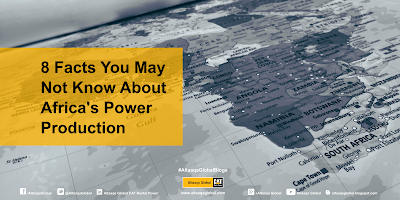Zambia and Mozambique’s dependence on hydropower is at high 90s
More than 99.6% of Zambia’s electrical energy is attributed to hydropower, while 99.8% of Mozambique’s electricity is generated by dams. In the coming years, however, experts see that Mozambique’s dependence on hydropower will be reduced as it set to become Africa’s biggest producer of natural gas.
Algeria produces 92.4% of its energy from natural gas
Algeria’s energy production from natural gas bested Egypt’s 75%, Ivory Coast’s 67.5%, Nigeria’s 50% and Gabon’s 40.5%. It is important to note that globally, Bahrain, Qatar and Turkmenistan meet completely all of their energy needs from gas.
Eritrea generates 99.4% of its energy from oil—the highest proportion globally
As a side note, a resident of Eritrea consumes the lowest energy per year of any nationality globally. A resident of the US consumes 55 times more, and that of Qatar 135 times more.
Botswana produces 100% of its energy from coal
Botswana has an estimated 35 billion tonnes of the resource. The government puts it at 212 billion tonnes. As a comparison, South Africa derives about 94% of its power from coal.
Botswana has the highest GDP per unit energy use
In 2012, the country derived $13.8 from a kilogramme of oil equivalent, making it the most efficient in Africa, and fifth most efficient globally. To contextualize this fact, Hong Kong is the most efficient, getting $24.6 from the same quantity.
South Africa is Africa’s largest producer of energy
South Africa produces 163 million tonnes of oil equivalent. It is ranked 17th in the world, with Algeria and Egypt as the only other African countries making it to the global top 30.
South Africa is the continent’s largest consumer of energy
According to the World Bank, South Africa consumes 141 million tonnes of oil. In comparison, China, South Africa’s largest trading partner, consumes 20 times more.
African countries are among the world’s lowest net importers of energy
Top African crude producers Republic of Congo, Gabon and Angola export all of their production and harness renewable energy sources instead. As an illustration, Congo produces just 0.7% of its electricity from oil and 60% from hydro, while Angola generates 70% of its energy from hydro.
The power and energy sector in Africa offers notable potential. Though still confronted with various power-related challenges, Africa has been showing significant momentum in power across the continent. Experts agree that a balanced and reliable energy mix, including traditional, renewable and temporary power sources, can keep Africa on the road to further economic and social development.
End
PRESS INQUIRIESAltaaqa Global
Tel: +971 56 1749505
rbagatsing@altaaqaglobal.com

No comments:
Post a Comment